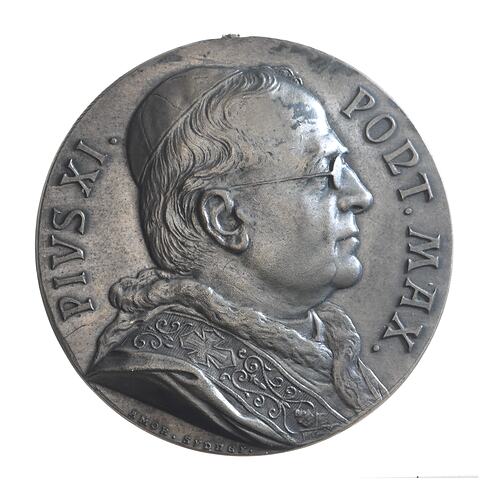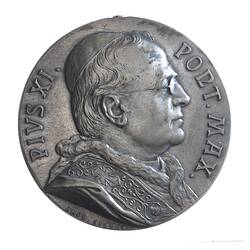Pope Pius XI was born 1857 at Desio, Italy as Achille Ratti, son of a silk manufacturer. He studied in Milan and at the Gregorian University of Rome, and was ordained in 1879. He taught in the Milan seminary before being appointed one of the college of doctors of the Ambrosian Library, Milan in 1888. Ratti won fame for his studies in paleography, and became Chief librarian in 1907. His church career continued to flourish as he was appointed Vice prefect of the Vatican Library under Pope Pius X. In 1918 he was made Papal legate to Poland in 1918 under Pope Benedict XV, and his political skill put the Church on good terms with the Polish government. He also made progress with the Bolsheviks in Russia. In 1919 he was awarded with the appointment of Papal nuncio to Poland, and in 1921 became Archbishop of Milan. After a short time as Cardinal he became Pope on 6 February 1922, at the age of 65.
Pius's pontificate, during the inter-war period, was marked by considerable diplomatic activity, often aided by Eugenio Pacelli (later Pope Pius XII). Pius openly opposed the youth activities of Fascist governments, and argued that it was not possible to be both Fascist and Catholic. Relations between Mussolini and the Holy See deteriorated. However, he was presiding over the Church when it signed a concordat with Hitler in 1933. The Nazis continually meddled with Church activities, persecuted clergy and tried to convert German Christians to the new faith in Nazism, and Pius finally denounced the government and Nazi theory in Mit brennender Sorge in 1937. Soon after he issued the analysis On Atheistic Communism, which denounced persecutions in Russia, Mexico, and Spain. He remained on unusually good terms with England, Holland and France.
Pius spoke out against nationalism, racism, anti-Semitism and totalitarianism, in favour of human dignity. He had little regard for laissez-faire capitalism, and urged social reform in the 1931 encyclical Quadragesimo anno. He called for 'Catholic Action', requiring greater participation by the laity, and supported missionary work, but wanted to integrate Christianity with native cultures instead of making them European. To protect Eastern rites Catholics from Latin influence he augmented their congregation, established a commission to study their canon law and asked Western Catholics to embrace their brothers of the various Eastern rites. Pius established Vatican radio and modernized the Vatican Library. He reconstituted the Pontifical Academy of the Sciences in 1936 with a large international membership.
References:
Catholic Community Forum website http://www.catholicforum.com/saints/pope0259.htm.
More Information
-
Keywords
-
Localities
-
Authors
-
Article types

